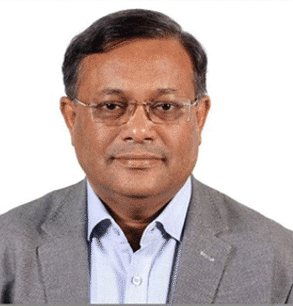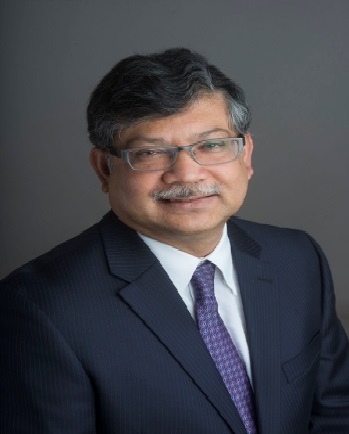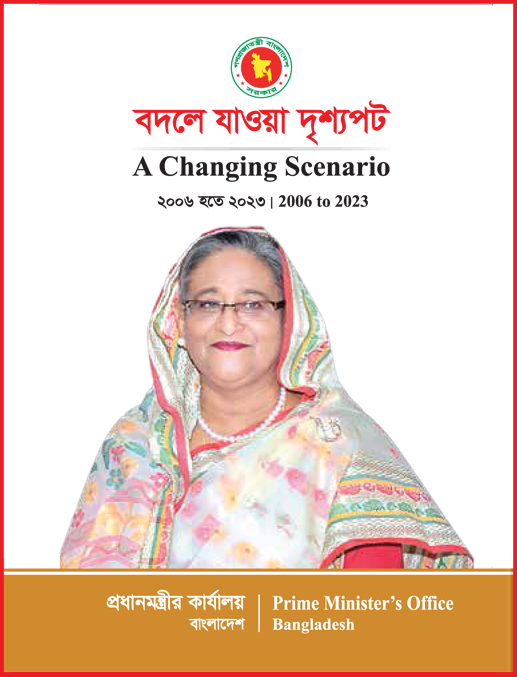Remarks by Hon’ble Foreign Minister Dr.A. K. Abdul Momen, MP, at the Asia Pacific Conference on Financing inclusive and Sustainable Development Dhaka, 10 December 2019
Remarks by
H.E. Dr. A. K. Abdul Momen, MP, Hon’ble Minister for Foreign Affairs
Government of the People’s Republic of Bangladesh
at the Asia Pacific Conference on Financing inclusive and Sustainable Development
Dhaka, 10 December 2019
Hon’ble President of the People’s Republic of Bangladesh,
Excellencies,
Ladies and Gentlemen,
Assalamu alaikum, peace be on you.
I am truly honored to join the Hon’ble President and all of you at this august gathering. I take this opportunity to express my sincere appreciation to ESCAP, ADB and London Institute of Banking and Finance (LIBF), for organizing this Conference jointly with ICC Bangladesh which is celebrating its 25th Anniversary.
I am also happy to extend my warm welcome to all visiting Hon’ble Ministers, high-level dignitaries and distinguished delegates from the Asia-Pacific region.
The selection of the theme ‘Financing Inclusive and Sustainable Development’ amply manifests our urgency regarding one of the most pressing issues of the present and the future. The topic could be more appropriate if it refers to ‘means of implementation or resource mobilization for SDGs’. For SDGs, resource means not only money but also technology. In fact, usually it covers a broad range of issues ranging from environmental, social, governance and impact investment to the total gamut of social finance and social value investment. The world is being continuously transformed by the forces of geopolitics, technology, climate change, economic wars, and other factors and the overall process of globalization. Globally uneven growth, rising debt levels, frequent and strong financial volatility, heightened global trade tensions are complicating the everyday availability of resources both finance and technology. Climate change is causing havoc, particularly for the most vulnerable countries like Bangladesh. While newer technologies are great yet many of these will potentially disrupt labor markets, putting additional burdens on social protection systems. In most of the countries the inequality is growing and the gender equality gap is not reducing. Against this global backdrop, organizing sufficient resources without causing any harm to the planet or its ecosystem through the mobilization process or through utilization remains a major issue. So we need to work on two challenges simultaneously. One is to secure inclusive and sustainable development and the second one is to mobilize adequate resources both finance and technology to attain this development that is ‘pro-people, pro-planet, more inclusive, more peaceful sustainable world for all where no one is left one.
Excellencies,
When we discuss about sustainable development, the first thing that comes to our mind is the 17 SDG goals and 169 targets. I am fortunate that I was personally engaged in the discourse and development of these goals and targets. To achieve these goals and targets, as per various estimates, it would require $5-$11 trillion a year. As per estimates, only to eradicate poverty, it would require $66b a year and to ensure healthcare and quality education for all, it would require $37 b and $42b a year respectively. As per ADB, only to have adequate infrastructure, Asian countries would require $8 trillion a year. For Bangladesh, our conservative estimate is that it would require an additional US$ 928.48 billion. This amount is around 20% of our accumulated GDP. There is simply no way that we can manage this colossal amount through traditional financing methods.
Currently, our development partners provide around $156b a year on average for all the developing countries which is around 3% of the requirement. Their contribution to 48 LDCs is around $38b which is around 0.8% of the requirement. So far, only 6 Development partners met their promise of 0.7 percent of their GNI which is very dismal. In recent years, development partners are becoming more and more miserly and they are shying off from their promises. Question is where should we get so much funds? It is a daunting task indeed. However, don’t be afraid or be pessimistic.
Remember, “Meg Deke tui Koresh nare voy, arale thar surjo hashe”. There is always sunshine after clouds.
The good news is, the South-South countries are coming up with innovative ways of financing. For example, $40b Asian Infrastructure Investment Bank and the $100b BRICS Bank are coming forward. In addition, allowing DFQF market access, reduction of remittance transfer, reduction of cost of migration, return of illicit money transfer and increasing domestic resource mobilization and technology transfer can go a long way in mobilizing much needed resources. Moreover, reallocation of resources away from defense expenditure to SDGs could also help a lot. For example, as per SIPRI, in 2013 alone, global community spent $1747, only for Defense expenditure that neither enhanced human safety or security. A 10% tax on it could result $174b for SDGs. As per Nobel Laureate Koilas Chakrawarthy of India, half an hour’s cost that is being incurred to maintain Nuclear arsenals that never used since 1946 could easily meet the needs of 270 million out of school children to attend schools. Although the development partners are finding difficulty or excuses not to increase their contributions to help developing ones or to meet their historical responsibility, the scenario is not that dismal. It is believed that global savings in private banks is around $23 trillion a year and if 20% of it is committed to SDGs, we can have $5 trillion. In addition, it is reported that $400 trillion is floating in the business sector and if they invest a part of it, we can have the needed financing. As per Amnesty International, only 85 persons in the world have wealth more than half of the global population and if such wealth could be correctly redistributed, for example, 10% wealth tax, the transformative and robust goals of the SDGs are not impossible to achieve. Global capital and bond markets have over $270 trillion daily transactions and a part of it could be a great help. Therefore, money is there and only we need to entice them, mobilize them and cajole them to invest in SDGs. In fact, we need rock-solid political commitment and strong partnership. Partnership between government and business sector, partnership between government and NGOs/ Philanthropies, and partnership between government and academic and research institutions can help us achieve required financing and technology. In Bangladesh, we have identified five potential sources of gap financing and these are: 1. Private Sector Financing for 42%, 2. Public Sector Financing for 34%, 3. Public-Private Partnership (PPP) accounting for 6%, 4. External Financing comprising Foreign Direct Investment (FDI), Foreign aid and grants will contribute 15% and 5. Non-Government Organizations (NGOs), philanthropy, return of illegal transfer of funds, etc will bring in around 4% totaling 100%.
Distinguished guests,
2015 was a historic year. We had four landmark agreements. First, the Paris Agreement on climate change, second, the 2030 agenda of the SDGs, third Sendai Disaster Preparedness initiative and fourth, the Addis Ababa Action Agenda or AAAA on Financing for Development. The Addis Ababa Agenda establishes a strong foundation that supports the implementation of the 2030 Agenda for Sustainable Development. It gives us a new global framework for financing sustainable development by aligning all financing flows and policies with economic, social and environmental priorities for all countries. These important milestones must be mainstreamed in all our strategies and plans and Bangladesh has taken these challenges seriously. It created a post of Chief SDG Coordinator under the Prime Minister’s Office plus formed a 16-member ‘SDGs Implementation and Monitoring Committee’ consisting of senior bureaucrats. It also assigned 40 Ministries/Divisions plus another 61 Independent Institutions who would do mapping in terms of 17 SDGs, 169 targets and 230 SDG indicators.
Despite signs of progress, new and innovative investments that are critical in achieving the SDGs remain underfunded. However, the growth in the green finance market for issuers has been especially strong since the introduction of green bonds in different markets. Like green bonds, sustainability bonds will also attract lots of attention in future. In 2017, UNDP Asia Pacific launched the ‘UNDP SDGs Impact Finance’ to proactively engage capital markets for sustainable development, and to establish new business models and innovative partnerships.
We desperately need to increase domestic tax revenue and fight the tax evasion, money laundering and illicit financial flows that undermine all our development efforts. We have to make spending more efficient, reduce corruption and improve the business environment to attract investment. We also need multilateral development banks to scale up and increase access to finance.
As I said, there is no shortage of capital in the global economy. The total stock of global financial assets has been estimated at around $400 trillion. We need to find out the ways to channel those vast sums effectively towards investments for sustainable development and for achieving the SDGs. From UNDP I can quote that the international institutional investors — such as sovereign wealth funds and pension funds— hold an estimated US$ 115 trillion in assets under management. But from the largest pension funds, less than 3 percent is invested in infrastructure and even lower shares in developing countries. Reorienting and redirecting even a fraction of these investments would accelerate sustainable development. Of late ‘Islamic finance’ has come out to be another big source of funds. Phasing out inefficient and harmful subsidies, such as fossil fuel subsidies, can provide us with lot of savings by freeing up resources in budgets that can be used for sustainable development and this will also save the planet and our posterity. More carbon taxing and incentives for renewable energy will also shift funds to our desired fields.
Another innovative financing mechanism is the Global Concessional Financing Facility (GCFF), an initiative jointly sponsored by the UN, the World Bank and the Islamic Development Bank in response to the Syrian refugee crisis. The GCFF is supported by Canada, Denmark, the European Commission, Germany, Japan, Norway, the Netherlands, Sweden, the UK, and the US. It supports countries that are hosting refugees by lowering their cost of funds and as we are suffering from Rohingya crisis, other countries in a similar situation may also be benefitted from this facility. The World Bank issued the world’s first global pandemic bond that will channel surge funding to developing countries facing the risk of a pandemic. It was designed to prevent another Ebola crisis elsewhere.
Ladies and Gentleman,
We know that international trade is another way of providing required financial assistance to the developing countries and no other country knows it better than Bangladesh. If the developing countries are given adequate market access, this will amply compensate any lack of funds for development. No wonder, we need trade not aid. And the last thing that will produce huge return on our investment is the new and frontier technologies and new varieties of foods and plants. There is hardly any better way than investing in the efficient new technologies which saves energy, nature and money but have a much higher productivity. We must provide good incentives to such investments.
Ladies and gentlemen,
These are in short some of the new and innovative ways to secure financing for inclusive sustainable development. Our Prime Minister Sheikh Hasina promoted the concept of people-centric development model in implementing the 2030 Agenda for Sustainable Development guided by the philosophy of our Father of the Nation Bangabandhu Sheikh Mujibur Rahman. We are confident that we will achieve SDGs as we did in the case of MDGs if all stakeholders continue to cooperate, collaborate and work in partnership with rock-solid political commitment.
Joy Bangla, Joy Bangabandhu













